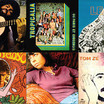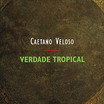Eubioticamente atraídos
it’s forbidden to forbid the bahians
Brazilian views
IT’S FORBIDDEN TO FORBID THE BAHIANS
Augusto de Campos
Published in Balanço da bossa e outras bossas, Editora Perspectiva, 1993
First published 1968
Not everybody is understanding the activity of the Tropicalia group (I would rather use Tropicalia instead of Tropicalismo, as I have always preferred to say Concrete Poetry instead of Concretism. “Ism” is the favorite suffix the opponents of renewal movements use to try to historicize and confine them. The Bahians are using a musical metalanguage, we may say, a critical language, through which they are reviewing all that is musically produced in Brazil and in the world, to consciously create, at first hand, something brand new. That is why their albums are an anti-anthology of unpredictabilities, in which anything can happen and the listener goes rediscovering everything, from a shock to another, and relearns to “hear with free ears” as Oswald de Andrade proclaimed in his manifestos: “see with free eyes “.
The Tropicalia’s composers and interpreters neither ignore João Gilberto’s contribution, nor intend to keep linearly diluting his creations. They swallow, in a cannibalistic way, the information that comes from bossa nova’s most radical innovator. And again they check and shock the whole Brazilian musical tradition, including the bossa nova, and confront it with the new information from the universal context. Super good taste and super bad taste, the refined and the gross, the avant-garde and the jovem guarda, berimbau and beatles, bossa and bolero are inventoried and reinvented, in the violent understanding of these album-happenings where even the redundant “mother heart” pulses again with the cannon shells of the new information.
This unrestricted openness is also responsible for an unprecedented fact in our popular music: the intimate collaboration of erudite avant-garde musicians, such as Rogério Duprat, an unusual association, even on worldwide level. And what causes the most advanced lines of avant-garde music – electronic and antimusic – merge with the popular music in an informative implosion from which anything may result, including a new music, which is at the same time “product and consumption” or “produssumo”* (*neologism mixing the two words in Portuguese: “producsumption”) as Décio Pignatari would say.
Instead of making the musical revolution on the thematic epidermis, Gil, Caetano and his partners are making a deeper revolution, which reaches popular music’s own language. That is why they disturb us more than many ostensive protesters soon assimilated by the system.
In an interview Caetano Veloso gave me, he said that he considered Tropicalismo a Neo-Cannibalism (alluding to the Cannibalistic movement of Oswald de Andrade). So it seems to me. If you want a “philosophical” explanation of Tropicalia, go to Oswald, the indigestible cannibal, not swallowed by our literatocrats for many and many years, until the concrete poets revived and reedited him, so that he, after stirring the theatre in José Celso’s extraordinary recreation, could come to explode the bomb of his revolutionary ideas towards consumption, through Caetano and the Bahians’ voices. “The mass will someday eat the petit four that I make”, predicted Oswald, when the Stalinists of his time accused him of not being understood by the “people”.
We could apply to the Tropicalia what Haroldo de Campos said about Oswald’s “Manifesto Antropófago” (Cannibalist Manifesto): “a Brazilian view of the world through a devouring perspective for the critical assimilation of the foreign experience and its reelaboration in national terms and circumstances, allegorizing this way the cannibalism of our savages. This is not about a new ‘Indianism’, as intended by the group ‘Verde-Amarelo’, from 1926 (called ‘Anta’ afterwards), which fought, but actually diluted the Oswaldian experiments, turning them into a literature of calungas ( fetish of a divine being of the banto cult) in Technicolor, classified by Oswald de Andrade as ‘macumba for tourists’. The Oswaldian Indian is not, he says that himself, the ‘cookie can Indian’ sentimentally idealized by our Romanticism, but the ‘cannibal’ of Montaigne (Des Cannibales), wielding his audacious critic over the deceit of the civilized man.” As we see, Oswald had the same enemies the Bahians have today: the conservatives, the Stalinists and the pseudo-nationalists, that, in music, I usually design by two expressive acronyms: T.F.M. and C.C.C. (Traditional Musical Family and Caetano Hunter Command). A thorn in the flesh of Brazilian literature, Oswald, as the composers of the Revolutionary Bahian Family, disturbed and disturbs.
The ones who want “participative” music, in conservative, folkloric form, should remember what Vladimir Mayakovski, one of the greatest participative poets of our time, said: “there is no revolutionary art without revolutionary form.” It is useless to turn Che into cliche. Obviously Mayakovski also disturbed. Right in the beginning he was already satirizing his “inquisitors”.
Mayakovski’s fight against the bureaucrats lasted his whole life. And his decision to commit suicide was certainly influenced by the debate he had with students of the USSR Popular Economy Institute, a little before he put an end to his life. Accused of being “obscure” and “incomprehensible to the proletariat”, Mayakovski, anguished, exclaimed: “After I die, you will read my verses with tender tears!”
The episode at the International Song Festival, during the São Paulo final rounds, at TUCA theater, was a symptom of the continuous nuisance the Bahians cause. It is true that Caetano and Gil went beyond the musical fact and decided to take their “provocation” into the physical behavior field. Even clothes have a language, they are a system of signs and contain, or might contain, a critical message. Caetano, being coherent with the lyrics of his music, wanted to awake, before a live audience, the consciousness of the repressive society that submits us, when he defied the public’s taboos and prejudices with his flamboyant clothes and the atypical intervention of the howl solo of the Americans. The same goes for Gil and Os Mutantes, with their unpredictable sounds and clothes. Clothes + aggressive dance + Fernando Pessoa’s poem + howl solo + melody + lyric were part of a happening, very well articulated in the musical avant-garde context of Rogério Duprat, who did not work as a mere arranger but as a true collaborator of the composition, giving structure and final elaboration to it. This is the crucial problem. While many “serious” experimenters of our popular music keep exploring dissonance, within a more or less Impressionistic aesthetic of the end of last century, the Bahians and Os Mutantes, along with Rogério, are already working in the terms of contemporaneous music, that is, they are 50 years ahead because they have taken into account the events of the first half of the century, from Stravinsky and Webern to Stockhausen and Cage, making the happenings, the noise and the electronic sounds burst at the consumerism level, and practicing a non-linear poetry, non-discursive, a poetry full of live editing and humor, camera-in-the-hand poetry, ultra-modern.
Unfortunately, the response from the youngsters that attended TUCA was coarse. They behaved exactly like the old Countess of Pourtalès, during the performance of Stravinsky’s Rite of Spring, at the Champs Elysées Theatre in Paris, 1913. Léon Oleggini says that there were “tempests of laughter, mockery and protests,” and that the Countess, truly offended, exclaimed, waving her ostrich-plume fan: “– Monsieur Astruc, this is the first time, in 60 years, that someone dares to mock me!” Booed was Stravinsky, as Schoenberg had been in Vienna, in 1907, at the opening of his première Chamber Symphony, as Debussy had been and would be, later, in 1954, as Eugene Varése, at the debut of Déserts , in Paris. And there we have four of the best modern composers.
Booing, this kind of booing, can be explained from the point of view of the Theory of Information. According to this Theory, which deals with communication as a system of signs, the musical message oscillates dialectically between banality and originality, predictability and unpredictability, redundancy and information. The listener who receives the message is preconditioned by a group of preceding knowledge, which constitute the code of conventions with which he appraises and checks the message. A code based on redundancy and predictability. Hence the shock and the angry, almost always irrational reaction when the message, because of its novelty and unpredictability, does not match the listeners code. But new knowledge and information can only come up if this code is broken. It is the mission of the informative, innovative artists to oppose the listener’s convention code in order to force their creative maturity, raise and enrich their repertoire of information. In summary, the artist dynamites the code dynamises the system. Caetano, Gil and Os Mutantes were intelligent and courageous enough to propose this challenge and to break with the Festival’s own structure, within which the composers do all they can to please the audience, seeking through the subservience to the listener’s convention code the indulgence and the approval to their “festival-like” music. Gil, the most sacrificed one, singing “out of tune”, “blew the jury’s mind,” in Caetano’s words. We may say that, by violently opposing the rules of the conventional judging code, the song turned the jury themselves – who, apart from Mr. Chico de Assis, were lucid enough to evaluate the importance of É Proibido Proibir – into spectators, “sympathetic but incompetent” to evaluate the song. Therefore, it failed to qualify.
Regarding the Festival’s audience, the given disparity between the Bahian’s new information and the public’s code has a critical and social meaning which will become clearer as the albums with the performed songs are heard and consumed. The boos speak against the one’s who boos, like a “certificate of old-age” that uncovers the whole list of prejudices which induced them into incomprehension and – even worse – intolerance. What is disappointing, in the incident with Caetano, is that this incomprehension, paradoxically came from our university youth (or part of it), for they were the predominant audience at TUCA, not the “people”, as some last-minute-superficial commentators want to make us believe. It demands courage to say that the ones who insulted the singer showed us the most irrational and fool collective hysteria; that the juvenile public, instigated by a stupid-pseudo-fascist-Stalinist group (the new C.C.C.), had the communication with the musical message obtruded and blocked, because of puerile prejudices which were imposed on them: against the clothes, against sex, against the electric guitar and against the noises incorporated into the music. This obtrusion came to such a point that they did not listen, did not understand anything, and when they did listen to something they, unconsciously, identified themselves with the establishment, which Caetano’s lyrics, clothes and physical behavior wanted to attack. So, the unlikable happened: the “youth” defended the System more intensely and strongly than our great-grand-mothers. The Countess of Pourtalès would not have done better. They did not even realize that the Festival was a spectacle where everyone was wearing costumes; only the plastic costumes of Caetano, Os Mutantes, and Gil, were ostensible, they did not hide the game, whereas the others’ were worn discreetly: there were robin-hood, Barra-Funda samba dancer, jazzman, student, homey boy and many other costumes…
Nevertheless, the booing had a positive aspect: it brought real life and participation into Caetano’s text, it made it possible for him to say NO to “no” and challenge his aggressors on the spot (“You will always, always, kill tomorrow the old enemies who died yesterday” and “if your ideas of politics are the same you have of aesthetics we are finished”.) Caetano’s speech, integrated to the happening of his song, is a fierce critical document whose importance transcends the popular music field to project itself in the history of the Brazilian modern culture, as a challenge for creation and intelligence, in tune with the pioneers of 22. Therefore, its recording was essential.
É Proibido Proibir shall rest as a mark of courage and artistic integrity, in spite of the whole ritual of prohibitions whose conclusion was the veto of Mr. Antônio Marzagão, who was not sensitive enough to understand that art rejects paternalism and that the bureaucrats’ job is not to patrol art, but simply to stimulate its manifestations. Caetano did well and showed coherence refusing to accept the International Song Festival’s direction demand that he performed his song without plastic and howls.
There are columnists and composers who think artist’s only duty is to flatter and herald the public taste. They are the defenders of what Umberto Eco called “gastronomic” music: give the audience what they already know and unconsciously expect to see repeated. Respect the code in order to be respected. In fact, this is the best way to deceive and disrespect the public. It would be easy for Caetano and Gil to cultivate this kind of “good behavior”, like some other composers, who are very “participative” but can barely hide their eagerness for the “gastronomic” applause. However, they preferred to take the almost suicidal risk of unpleasing in order to awake their message receptors’ sleeping consciousness of liberty. Perhaps it will take time for them to be understood. It does not matter. As Fernando Pessoa said, “tomorrow belongs to today’s fools”. And as Décio Pignatari remarkably said: “in the Brazilian geléia geral someone has to function as the medulla and the bone”.























